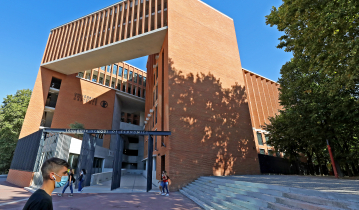Joe Dong Hee will defend his thesis on the 18th July at 10:30 am, Room MF 323 on «Three Essays on the Effect of Voter Turnout on the Subsequent Performance of Elected Official"
- Karine VAN DER STRAETEN , Senior Researcher CNRS.
- Sylvain CHABE-FERRET, Assistant professor, TSE
- Enriqueta ARAGONES, Professor, Institut d’ Analyses Economiques, Universitat Autonoma de Barcelona
- Raymond DUCH, Professor, Oxford University
Abstract:
This dissertation analyzes the effect of voter turnout on the subsequent performance of the elected official. By shedding light on this new topic, it contributes to the ‘political agency’ literature which studies various ways to improve the functioning of elected offices.
Chapter 2 estimates the effect of turnout in the 18th National Assembly of South Korea (2008 ~2012), the country’s legislature. The data consists of a cross-section of legislator-constituency pairs. To overcome the endogeneity of turnout, it utilizes the variation in turnout caused by the unusual rainfall on election day and the number of polling places per voter. It finds positive effects on legislative performance. Then it proposes a theoretical explanation for the findings, in which turnout signals the share of voters who will learn the incumbent’s performance. The theory has a negative implication for compulsory voting, because it will reduce the signaling role of turnout.
Chapter 3 extends this empirical framework in the 13th National Assembly of France (2007 ~2012). An important difference from the South Korean counterpart is its limited capacity to initiate legislation, which makes it an ideal environment to test the generality of the relation discovered in South Korea. It finds positive effects on attendance and participation in debates, but not on formal legislation or government monitoring. Possible explanations for this difference are discussed.
Finally, Chapter 4 presents a game-theoretic explanation for the empirical findings, in a two- period model of political agency. An election is held at the beginning of each period to delegate a policy decision to a politician, whose policy preferences are private information. A representative voter decides, in each election, whether to vote for a politician or abstain. Voting incurs an op- portunity cost, which is her private information; and politicians are identical ex-ante. Despite the sub-optimality of turning out in the first election, she may still do so, to signal her willingness-low cost-to punish wrong policy in the following election. The model has a positive implication for having more polling places and a negative one for making election day a public holiday, which follow from their impacts on the distribution of voting cost.



